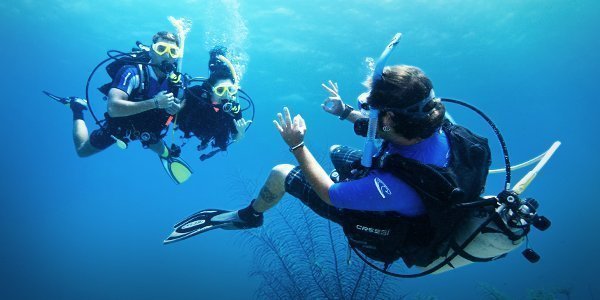Working as a PADI Divemaster is more than just knowledge, training, skills, and practice; it’s about having the right attributes to give every diver the best underwater experience, every time.
To excel in a PADI Divemaster role, you’ll need to be:
- Fun. Aside from safety, being fun is one of the most important things you can bring to someone’s scuba experience. Diving should be enjoyable, not boot camp, so focus on making guests feel relaxed and happy — before, during, and after!
- Patient. We were all newbies once, and skills that are easy for you may take a novice several tries to get right. If they’re struggling, don’t rush them; instead, break things down into smaller, more manageable steps.
- Adaptable. Every diver is different. Some like visual aids, while others prefer a hands-on approach. They could have learning or physical impairments. They might favour formality, or not. Get to know your students and adopt a style that inspires them to succeed.
- Selfless. Yes, you’re living the dream, but you’re also working, so your guests’ interests must come before yours — no sulking because they wanted to photograph nudibranchs instead of hanging out with whale sharks (or vice versa!).
- Meticulous. Helping divers with paperwork, checking PADI Standards, fixing equipment, and spotting risks while underwater are just a few of many tasks which need excellent focus and observational skills. Safety is paramount, so there’s no room for cutting corners.
- Hardworking. Days can be long, intense, and both physically and mentally demanding — with little time off in between. Every dive operation is a team effort, and everyone needs to play their part — from helping students, to filling tanks and manning the shop.
- Respectful. You’ll be assisting PADI Instructors to teach courses, so you’ll need to be dutiful and follow their lead. If you’re itching to conduct the session yourself, then it could be time to book onto a PADI Instructor Development Course.
- Calm. It’s not uncommon for students to be anxious, especially if they’re about to try something new. Your ability to stay calm — even when things aren’t going to plan — will help prevent routine nerves from turning into a panic.
- Positive. If you didn’t see the manta, talk about the other things you saw instead. If a student struggled with a skill, remind them what they did well. Not every dive earns a gold star, but focusing on positives gives everyone a reason to want to come back and do it again.
- Professional. Whether it’s being presentable and punctual for work, being polite to guests (even when they’re not extending the same courtesy to you), or being a role model above and below the surface, it’s essential to take pride in your title of PADI Professional.
If you’re ready to start working as a PADI Divemaster, head over to the PADI Pros’ Employment Board to see vacancies from around the world. Or, take the next step in your adventure with the PADI Instructor Development Course.




